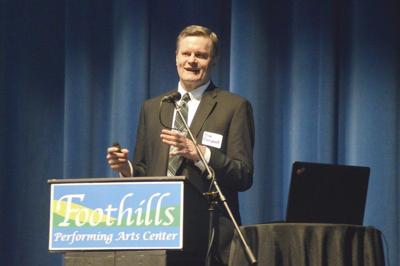
Sarah Eames | The Daily Star Dr. Joseph P. Campbell Jr., head of the artificial intelligence technology and systems group at Massachusetts Institute of Technology’s Lincoln Laboratory, discusses the use of technology in detecting human trafficking at a lecture series presented by A.O. Fox Hospital at the Foothills Performing Arts Center in Oneonta on Monday.
Oneonta native Dr. Joseph P. Campbell Jr. presented on the use of technology in detecting human trafficking at the Alexander F. Carson lecture series hosted by A.O. Fox Hospital at the Foothills Performing Arts and Civic Center in Oneonta on Monday.
Campbell leads the artificial intelligence technology and systems group at Massachusetts Institute of Technology’s Lincoln Laboratory, one of 46 agencies to collaboratively develop Memex, a program of the federal Defense Advanced Research Projects Agency to support the White House’s 2014 big data initiative to overcome the limitations of general search engines.
“Human trafficking is a startlingly large economy and is rapidly growing,” Campbell said. “The scale of illicit activity conducted online greatly outpaced the tools traditionally used by investigators to combat human trafficking. This is a tool investigators can use to gain situational awareness about the players in the online sex economy.”
Memex has been used by the office of the District Attorney of New York since 2014, Campbell said, and has since transformed its ability to investigate trafficking arrests from less than 5% to 60% in 2017.
“Unlike what you see in movies with artificial intelligence, we’re not making robots, we’re not replacing people,” Campbell said. “Instead we’re augmenting our humans to give them superhuman performance to deal with a super difficult problem.”
Human trafficking is a large and growing illicit economy increasingly mediated online, Campbell said, and the high volume and velocity of online sex advertising makes understanding the economy very difficult.
The second-largest advertising site in the world, Backpage, was accessed by users in all major metropolitan areas in more than 100 countries and mentioned in 73% of child trafficking reports to the National Center for Missing and Exploited Children, Campbell said. More than 10 million* ads with 500,000 unique phone numbers were posted between March and August 2017, and the site was valued $500 million when it was seized by the Department of Justice in April 2018, according to Campbell.
The void left in its wake was quickly filled by a multitude of similar platforms, Campbell said, making it more difficult for law enforcement agencies to track victims and perpetrators.
A computer can learn to perform tasks without being explicitly programmed to do so by reviewing large swaths of data, similar to the way a household smart speaker can pick up on and differentiate the voices of its users, Campbell said, and “the computer processing that we refer to as artificial intelligence can then process the data to understand and extract patterns and build models during the training phase.”
Memex is used to link personas across different online platforms, using information from a persona on one platform to find users likely to be the same person on other platforms based on the user profile, content and network information, Campbell said. Not all information is available on every profile, but the program can be used to highlight hard data like locations and phone numbers, and to recognize soft biometric data like facial features and audio patterns.
Victims are often forced to write their own online ads, but many will use a template, Campbell said, and the program is used to search for the repetition of key words and phrases like “new in town,” “fun in the sun” or “unrushed companionship.”
“We can learn the template across many thousands of ad examples to connect people trafficked by the same organization and hypothesize templates that belong together,” he said.
Technology is only a small part of the solution to a much larger problem, Campbell said. He encouraged medical professionals in the audience to understand the risk factors of human trafficking, including recent migration or relocation, substance use, runaway or homeless youth, mental health problems and involvement in the child welfare system.
Citing a 2014 study conducted through the Loyola University Chicago School of Law, Campbell said “88% of victims had contact with at least one health care professional at some point during the period in which they were being trafficked; however, none were identified or offered assistance to get out of bondage during the encounter.”
Human traffickers commonly advertise children for sex using explicit pictures taken in hotel rooms, Campbell said, and a database compiled by law enforcement agencies around the world using crowd-sourced photos of hotel rooms at traffickcam.com has helped to track the activity.
To report suspected trafficking victims, call the National Center for Missing and Exploited Children at 800-THE-LOST or visit missingkids.com. To access the National Human Trafficking Hotline, call 888-373-7888, text BeFree or visit humantraffickinghotline.org.